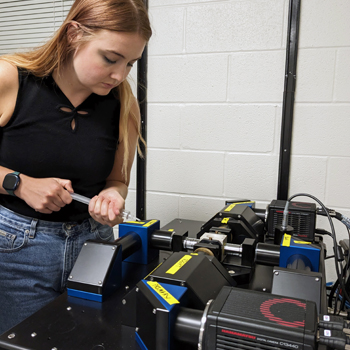Advanced Technology
When the right microscope doesn’t exist, these optical innovators invent it - Dr. Cez Borba, Dorothy Mitchell & other scientists are using groundbreaking microscopes developed by optical engineer and neurobiologist Dr. James Strother to explore questions like how tissues recover from injury and how nerve cells are wired together.
UF News ArticleIlluminating Marine Biodiversity

Advanced Technology
A key investment that will drive the Center’s work is the purchase and customization of two cutting edge light sheet microscopes, both advanced instruments to perform high-speed and long-duration live specimen imaging, revealing unprecedented insights into the natural world.
Light sheet microscopy is the newest tool to visualize complex cell processes in real time and holds promise for advancing key Whitney research goals for neuroscience and molecular biology. It is a revolutionary new strategy to capture high resolution images of life with virtually no interference that help us address long standing scientific questions.
Training the Scientists of Tomorrow

Research Fellowships
We look to provide three graduate students with research (RA) fellowships for the first two years of their study. For Graduate Student Fellows not only would this initiative look at current research questions, but it would open access for students who will be the future scientists contributing to the fields of biology, neuroscience and machine learning (AI).
Through this initiative three students will embark on this research program. Their first two years of RA ship would be through this initiative, and the faculty would secure competitive grant funding for the rest of their studies (usually a total of 5 years).
Visiting Scholars Program
A visiting scholars program would be implemented as part of the center. This would spread our acumen throughout the country as well as provide future expertise in this area. Each visiting scholar would stay at the Whitney Research Village and complete advanced studies using the technology developed.
They would add to their research during a 2-4-week term at the Whitney Laboratory and take their knowledge back to their institutions throughout the country. We seek to form alliances with traditionally underserved in science schools as well as minority serving Colleges and Universities for this partnership.
Expanding Research

Biology, Neuroscience and Machine Learning (AI)
Approximately 75% of all animal life resides in the Earth’s oceans. We plan to leverage the diversity and unique attributes of marine animals to explore nervous system dynamics, and recovery from injury for regeneration. The physical location of the Whitney Lab on a barrier island in Northeast Florida bordering the most pristine estuarine system left on the east coast of the country, is truly unique in that it allows the sampling of perhaps the most diverse group of marine organisms in the country.
Using many transparent animals studied at the Whitney Laboratory will allow us to do whole organism experiments with this technology, an incredible advantage over other competitive research programs that do not have access to the biodiversity in our region. Two research goals around nervous systems and cell regeneration will be the first two key focus areas, and 80% of Whitney Laboratory faculty would be involved with center research.
Two teams are going to be spearheading this work:
Zebrafish models, stress and sensory work
Ctenophores and other invertebrates and development
Not only would this initiative look at current research questions, but it would open access for students who will be the future scientists contributing to the fields of biology, neuroscience and machine learning (AI).
Support the Vision
Support the Center for Biological Imaging research and training program.
